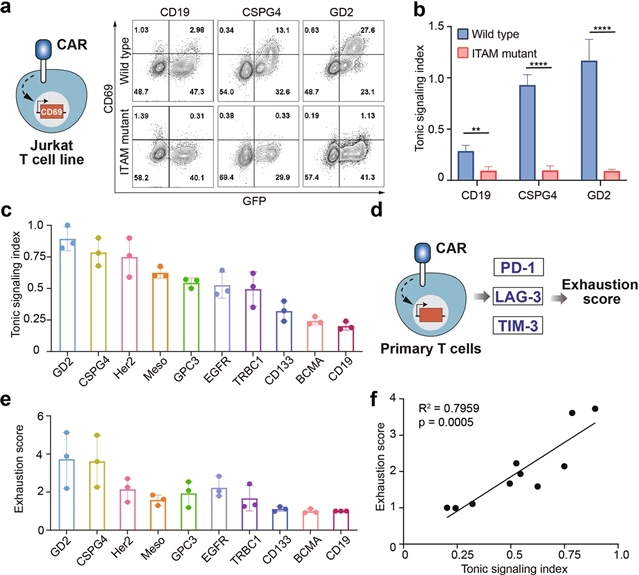
上海临床研究与试验中心Haopeng Wang,复旦大学Haitao Wu,中国科学院大学Chenqi Xu和上海交通大学医学院Xianmin Song共同合作,近期取得重要工作进展。他们研究发现可以通过调节嵌合抗原受体的电荷密度来优化基底信号和CAR-T细胞适应性。相关研究成果2023年3月8日在线发表于《细胞研究》杂志上。
据介绍,嵌合抗原受体(CAR)的基底信号(Tonic signaling),即在没有肿瘤抗原刺激的情况下自发激活CAR,被认为是控制CAR-T疗效的关键事件。然而,自发CAR信号的分子机制仍不清楚。
研究人员揭示了CAR抗原结合结构域表面的带正电荷的斑块(PCP)介导CAR聚集并导致CAR基底信号传导。对于具有高基底信号的CAR(例如,GD2.CAR和CSPG4.CAR),在体外CAR-T细胞扩增期间减少CAR上的PCP或提高培养基中的离子强度可最小化自发CAR激活并减轻CAR-T细胞耗竭。相比之下,在CAR中引入具有弱基底信号的PCP,如CD19.CAR,可提高体内持久性和优越的抗肿瘤功能。这些结果表明,PCP介导的CAR聚集可诱导和维持CAR基底信号传导。研究人员产生的改变PCP的突变保持了CAR的抗原结合亲和力和特异性。
因此,这一研究结果表明,合理调整PCP以优化CAR-T细胞的基底信号传导和体内适应性是下一代CAR的一个有前途的设计策略。
附:英文原文
Title: Tuning charge density of chimeric antigen receptor optimizes tonic signaling and CAR-T cell fitness
Author: Chen, Jian, Qiu, Shizhen, Li, Wentao, Wang, Kun, Zhang, Yu, Yang, Han, Liu, Baichuan, Li, Guangfei, Li, Li, Chen, Min, Lan, Junjie, Niu, Jiahua, He, Peijie, Cheng, Lei, Fan, Gaofeng, Liu, Xin, Song, Xianmin, Xu, Chenqi, Wu, Haitao, Wang, Haopeng
Issue&Volume: 2023-03-08
Abstract: Tonic signaling of chimeric antigen receptor (CAR), i.e., the spontaneous CAR activation in the absence of tumor antigen stimulation, is considered to be a pivotal event controlling CAR-T efficacy. However, the molecular mechanism underlying the spontaneous CAR signals remains elusive. Here, we unveil that positively charged patches (PCPs) on the surface of the CAR antigen-binding domain mediate CAR clustering and result in CAR tonic signaling. For CARs with high tonic signaling (e.g., GD2.CAR and CSPG4.CAR), reducing PCPs on CARs or boosting ionic strength in the culture medium during ex vivo CAR-T cell expansion minimizes spontaneous CAR activation and alleviates CAR-T cell exhaustion. In contrast, introducing PCPs into the CAR with weak tonic signaling, such as CD19.CAR, results in improved in vivo persistence and superior antitumor function. These results demonstrate that CAR tonic signaling is induced and maintained by PCP-mediated CAR clustering. Notably, the mutations we generated to alter the PCPs maintain the antigen-binding affinity and specificity of the CAR. Therefore, our findings suggest that the rational tuning of PCPs to optimize tonic signaling and in vivo fitness of CAR-T cells is a promising design strategy for the next-generation CAR.
DOI: 10.1038/s41422-023-00789-0
Source: https://www.nature.com/articles/s41422-023-00789-0
Cell Research:《细胞研究》,创刊于1990年。隶属于施普林格·自然出版集团,最新IF:20.057
官方网址:https://www.nature.com/cr/
投稿链接:https://mts-cr.nature.com/cgi-bin/main.plex
